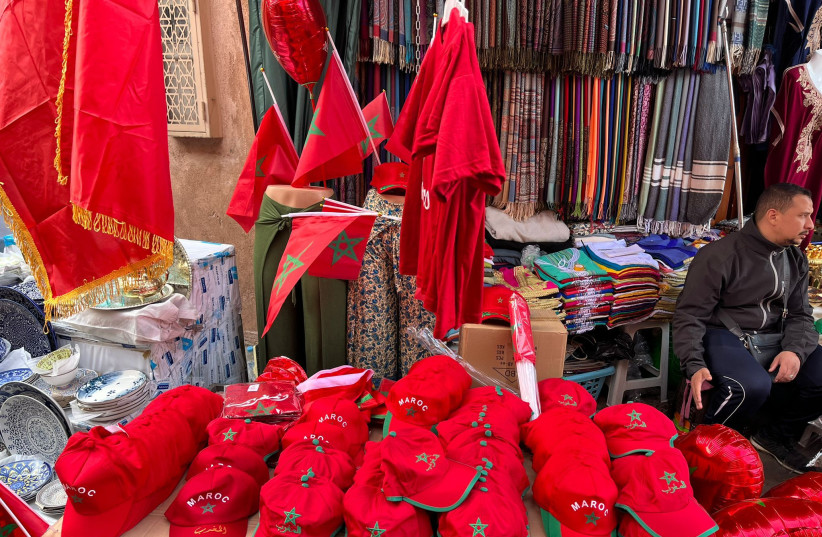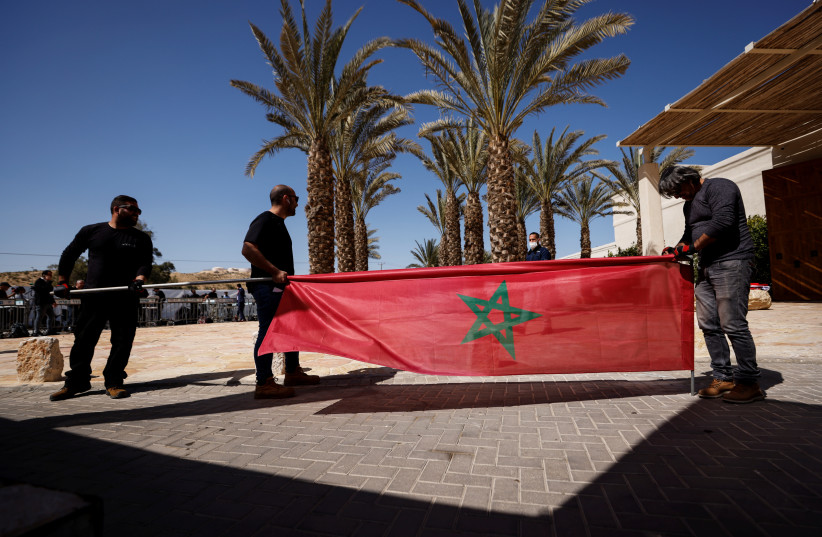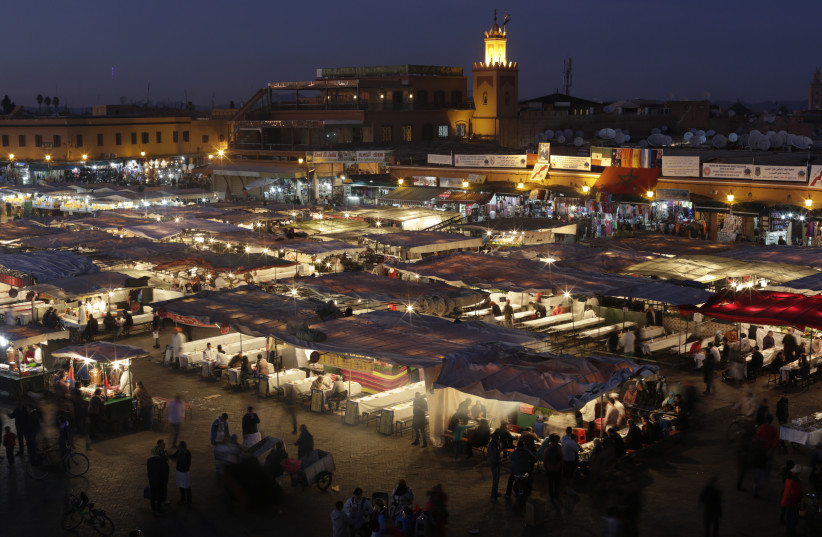MARRAKECH ‒ Three years into the Abraham Accords, ties could not be better between Israel and Morocco, but “to sustain an airline route, the plane must be full of tourists, businessmen [and] passengers in both directions,” Israel Association of Travel Agencies and Consultants (ITTAA) chairman Kobi Karni said Tuesday at the organization’s annual conference.
The association has about 400 Israel-based travel agencies and 4,500 tourism consultants. It has both a legal and educational reach, and its goals are oriented around advancing and expanding the industry.
Early Monday morning, some 300 Israelis boarded a chartered Royal Air Maroc flight from Tel Aviv to Marrakech, all representatives of different branches and organizations in the travel and tourism industry. This year, due to its location, it was jointly hosted by the airline, the Moroccan National Tourism Office (ONMT) and El Al.
It has been three years since the seminal gathering on the White House lawn that became the signing of the Abraham Accords, establishing a new chapter in Israel’s place in the region. Momentum has not slowed. It has sped up, and that is clearer than ever when it comes to commerce and tourism.
That so many officials were able to gather in Morocco “is a strong statement that industry is alive,” ONMT CEO Adel El Fakir said Monday night at the conference’s opening gala dinner.

“I have never seen such energetic, happy faces in this room,” he said. “Welcome to your second home, your second country.”
The first-ever conference of the ITTAA was hosted in Morocco 25 years ago.
On Tuesday, Fakir said the goal was to almost triple the number of Israeli tourists coming into Morocco, from 70,000 to 200,000.
In April, ONMT launched its “Kingdom of Light” campaign to offer the world an accessible, colorful and inviting snapshot of Moroccan life, culture and heritage to attract travelers.
“This is almost a family reunion between our people, who share a unique, deep and centuries-old relationship,” Fakir said.
Eyal David, deputy chief of mission of Israel in the Kingdom of Morocco, said the relationship between the two states is “not only government to government, but people to people, business to business.”
Strengthening ties through tourism
“Tourism often has great power, has more than once been ahead of politics, breaks barriers and prepares the ground for a strengthening of political ties,” Karni said.
International Air Services (IAS), a company that was established 42 years ago as a supplier of information to travel agencies, has expanded far beyond that to three different websites that cover a number of tourism topics, including cruises.
The owners summarized the essence of tourism as follows: “You need to go far away and see beautiful things.”
The flourishing relations between Israel and Morocco are impressive for only two years of formal normalization, including cultural, business, diplomatic and security exchanges, David said, adding that Morocco is a place of coexistence and tolerance, which should only encourage this more.
Karni spoke about the crux of the industry and said: “We are aware that tourism does not work in one direction. Tourism is a bridge between peoples and between cultures, between faiths and sects of believers. You must believe in the added value to humanity, appreciating people for what they are in all parts of the world, their way of life, their customs and manners and their spiritual world.”

The problem is that the flipside of this tourism, Moroccans coming to Israel, is not nearly in that range. If economic growth is a two-way street, why does this happen and what can be done to fix it?
“It’s expensive, and it isn’t really reciprocal,” David told The Jerusalem Post.
Booking flights from Morocco to Israel
Why aren't Moroccans booking flights to Israel at the same rate as Israelis to Morocco?
“It’s very expensive to get to Israel,” David said. “Prices started at $400 to $500; now they’ve tripled. And every time I have been given different reasons for why it’s like that. There are four different airline companies [Royal Air Maroc, El Al, Israir and Arkia] involved here, [so] there’s no reason there shouldn’t be some competition.”
“The solution starts there,” he said. “Let’s begin by having more affordable tickets. It all depends on what people have in their pockets.”
Travel, although expensive, is essential in an existential sense of knowing the world and of wanderlust, but it usually is not high up on the priority list. High prices make that task – undertaken by travel agents – even more difficult.
Tourism accounts for 60% of Morocco’s GDP, Fakir said, adding that it is more than that: “It’s also a part of our way of life.”
Currently, there are five weekly flights between Tel Aviv and various Moroccan cities.

The people behind the TravelList website for comparing prices framed it within the context of pre- versus post-pandemic prices.
Before the coronavirus outbreak, people were ordering tickets three to six months in advance. During the pandemic, the security on the flights, status of vacation destination and ability to plan in advance completely disappeared.
“They got smarter,” one of the TravelList representatives said. The prices dropped for a second “to show that they can drop,” and then they went right back up.
According to Karni, “Tourism is based on reciprocity between states. However, even with strong ties in both tourism and culture, at the end of the day, planes can’t fly empty in one direction. As long as there is [only] demand on one side – from Israel to Morocco – the [prices of] flights will remain high.”
“It’s a six-and-a-half-hour flight,” he told reporters. “Flight prices have no shelf life; they change in an instant. If they aren’t lowering them, it means they need to keep them where they are, and there’s a demand for these tickets, clearly. Look at how prices are rising in Israel in response to the demand.”
Fakir said: “When COVID hit our industry, there were some doubts about its importance. But the pandemic showed us that it is a critical part of our world. We need to fly to connect with others. We know that now.”
ITTAA conference MC Faisal Hassan said: “You see how serious we [the Moroccans] are about hospitality. I say share because we have the same ancestor: Abraham. Hospitality is sacred. The act of welcoming a traveler, a stranger, for nothing other than being a human being is nothing short of an expression of goodwill.”
Israelis who travel to Morocco do so for a variety of reasons, David told the Post, but “Morocco is also a Muslim country that is not just Arab but made up of a number of ethnicities [Berber and Andalusian]. It is diverse, and that’s what’s so attractive and beautiful about it. It is a country with a steep history, thousands of years old, and a royal family that is tolerant, respectful and welcoming.”
The question is, how do you flip it?
David had previously served as the deputy ambassador to Kenya, providing him with insight into the marketing issue.
“It’s easy to market Israel to the world,” he said. “There’s only one Holy Land. For Christians, it’s walking in the footsteps of Jesus. Al Aqsa Mosque is the third-holiest site in Islam – that’s huge.”
“There are always forces that could disrupt what’s been built here,” he added. “Last time it was the Second Intifada. But at the end of the day, international relations are based on interests, for Israel and Morocco to be friendly, and those interests override everything else.”
“This is something that crosses political borders,” David said. “Israel and Morocco are a sure thing.”
